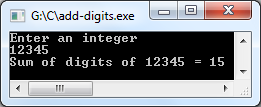C programming code
For example if the input is 98, sum(variable) is 0 initially
98%10 = 8 (% is modulus operator which gives us remainder when 98 is divided by 10).
sum = sum + remainder
so sum = 8 now.
98/10 = 9 because in c whenever we divide integer by another integer we get an integer.
9%10 = 9
sum = 8(previous value) + 9
sum = 17
9/10 = 0.
So finally n = 0, loop ends we get the required sum.
98%10 = 8 (% is modulus operator which gives us remainder when 98 is divided by 10).
sum = sum + remainder
so sum = 8 now.
98/10 = 9 because in c whenever we divide integer by another integer we get an integer.
9%10 = 9
sum = 8(previous value) + 9
sum = 17
9/10 = 0.
So finally n = 0, loop ends we get the required sum.
Download Add digits program.
Output of program:


Add digits using recursion
Static variable sum is used and is initialized to 0, it' value will persists after function calls i.e. it is initialized only once when a first call to function is made.
No comments:
Post a Comment